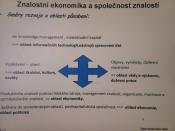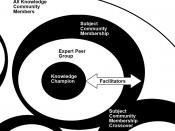The concept of treating organizational knowledge as a valuable asset to leading organizations has been popularized by leading management and organization theorists. Organizations are being advised that in order to remain competitive, they must efficiently and effectively create, locate, capture, and share their organization's knowledge and expertise, and have the ability to use that knowledge on specific problems and opportunities. Firms are showing a tremendous interest in implementing knowledge management processes and technologies, and are even beginning to adopt knowledge management as part of their overall business strategy.
Although knowledge management is becoming widely accepted, few organizations today are fully capable of developing and leveraging critical organizational knowledge to improve their performance. Many organizations have become so complex that their knowledge is fragmented, difficult to locate and share, and therefore redundant, inconsistent or not used at all. In today's environment of rapid change and technological discontinuity, even knowledge and expertise that can be shared is often quickly made obsolete.
However, while many people call for effectively managing knowledge, almost no research has been done regarding how to do it.
What is Knowledge?
Knowledge is commonly distinguished from data and information. Data represents observations or facts out of context, and therefore not directly meaningful. Information is derived from placing data within some meaningful context, often in the form of a message. Knowledge is what we come to believe and value based upon the meaningfully organized information (messages) one gains through experience, communication or inference. Knowledge can be viewed both as a thing to be stored and manipulated and also as a process of simultaneously knowing and acting - that is, applying 'expertise'. In order to succeed in today's business world, organizations need to manage knowledge both as an object and as a process.
Knowledge can be tacit or explicit. Tacit knowledge...


